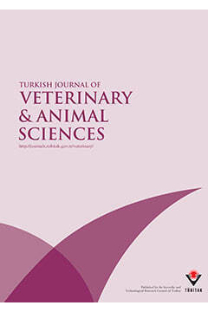The Effects of Qualitative and Quantitative Protein Malnutrition on Cecal Microbiota in Wistar Rats with or without Neutrophil Suppression
Diet, qualitative and quantitative protein malnutrition, neutrophil suppression, cecal microbiota, rat
The Effects of Qualitative and Quantitative Protein Malnutrition on Cecal Microbiota in Wistar Rats with or without Neutrophil Suppression
Diet, qualitative and quantitative protein malnutrition, neutrophil suppression, cecal microbiota, rat,
___
- Deitch, E.A., Winterton, J., Berg, R.: Effect of starvation, malnutrition and trauma on the gastrointestinal tract flora and bacterial translocation. Arch. Surg., 1987; 122: 1019-1024.
- Tannock, G.W., Savage, D.C.: Influences of dietary and environmental stress on microbial populations in murine gastrointestinal tract. Infect. Immun., 1974; 9: 591-598.
- Hinton, A., Buhr, R.J., Ingram, K.D.: Physical, chemical and microbiological changes in the ceca of broiler chickens subjected to incremental feed withdrawal. Poultry Sci., 2000; 79: 483- 488.
- Alles, M.S., Hartemink, R., Meyboom, S., Harryvan, J.L., Van Laare, K.M.J., Nagengast, F.M., Huatvast, J.G.A.J.: Effect of transgalactooligosaccharides on the composition of the human intestinal microflora and putative risk markers for colon cancer. Am. J. Clin. Nutr., 1999; 69: 980-991.
- Ralf, H., Rombouts, F.M.: Comparison of media for the detection of bifidobacteria, lactobacilli and total anaerobe from faecal samples. J. Microbiol. Meth., 1999; 36: 181-192.
- Steel R.G., Torrie J.H., Dickey D.A.: Principles and Procedures of Statistics. Third edition, McGrow-Hill Co. New York 1996.
- Savage, D.C.: Microbial ecology of the gastrointestinal tract. Ann. Rev. Microbiol., 1977; 31: 107-133.
- Gracey, M., Suharjono, M., Stone, D.E.: Microbial contamination of the gut: another feature of malnutrition. Am. J. Clin. Nutr., 1973; 26: 1170-1174.
- Chandra, R.K.: T and B lymphocyte subpopulations and leukocyte terminal desoxynucleotidyltransferase in energy protein malnutrition. Acta Ped. Scand., 1979; 68: 841-845.
- Chandra, R.K.: Numerical and functional deficiency in T hepler cells in protein energy malnutrition. Clin. Exp. Immunol., 1983; 51: 126-132.
- Aschkenasy, A.: Effets de divers mélanges d’acides aminés sur la régénération des leucocyts chez des rats carancés en proteinés. II. Lymphocyts. C. R. Soc. Biol., 1966; 160: 1787-1792.
- Chevalier, P., Aschkenasy, A.: Hematological and immunological effects of excess dietary leucine in the young rat. Am. J. Clin. Nutr., 1977; 30: 1645-1654.
- Balkaya, M.: Der Einfluß des Proteinmangels auf das weiße Blutbild von Wistarraten und Hähne der Rasse Weißes Leghorn. Inaugural-Dissertation, Fachbereich Veterinär-medizin, Justus- Liebig-Universität Gießen 1991.
- Balkaya, M.: The effects of feeding gelatin containing diet and following complete feeding on the counts of the peripheral white blood cells of the male female wistar albino rats. Tr. J. Vet. Anim. Sci., 1999; 23: 417–429
- Gorbach, S.L.: Lactic acid bacteria and human health. Ann. Med., 1990; 22: 37-41.
- ISSN: 1300-0128
- Yayın Aralığı: 6
- Yayıncı: TÜBİTAK
Changes in Chemical and Mineral Contents of Awassi Ewes’ Milk During Lactation
Nuray ŞAHAN, Dilek SAY, Ali KAÇAR
Some Reproductive Parameters and Biochemical Properties in Akkaraman and Awassi Rams
Vaccine-associated Feline Sarcoma (VAFS) with Multiple Recurrences in a Turkish Van Cat
Sensible and Latent Heat Productions from Broilers in Laboratory Conditions
Changes in chemical and mineral contents of Awassi ewes' milk during lactation
Dilek SAY, Nuray ŞAHAN, Ali KAÇAR
Ahmet ALP, H. Murat BÜYÜKÇAPAR, Orhan BÜLBÜL, Cemil KARA
Morphometric and Electrophoretic Variation in Different Honeybee (Apis mellifera L.) Populations
Open Heart Surgery Applications in Dogs Suffering from Natural Infection of Dirofilaria immitis
